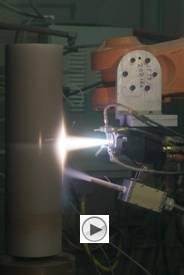Jun 1 2008
Air Products has installed its new cryogenic nitrogen-based thermal spray cooling system at Progressive Technologies, Inc.’s (PTI) Grand Rapids, Mich. facility. The two companies are teaming up to allow potential customers to see first-hand how the new system maintains desired part temperature using cryogenic nitrogen vapor (-320°F) during the thermal spray coating application process. This collaboration enables thermal spray applicators to see demonstrations of the Air Products cooling system, as well as test the effectiveness of the system on their own specific parts at a low cost and without interruption to their business.

“We understand that customers are more likely to evaluate new technology if we can minimize their cost and eliminate set up time and disruption to their operations,” said Stew Stringer, Air Products’ Metals Industry marketing manager. “Air Products is pleased to be working with PTI to provide a facility for demonstrating how our cryogenic nitrogen vapor cooling system enables coatings to be applied faster and at a lower cost than traditional cooling methods. This technology is a great example of Air Products using its expertise in cryogenics and gases to solve customer issues—like cooling, develop gas based solutions, and then cooperate with leading companies like PTI to more rapidly bring these technologies to market.”
Air Products’ U.S. patent-pending cryogenic nitrogen vapor cooling technology makes high-quality thermal spray coatings possible by maintaining part temperature within a +/–20˚F range, even for heat-intensive spraying processes like HVOF (high velocity oxygen fuel) and plasma spraying. The new cooling system uses a cryogenic spray nozzle that installs easily on any robotically operated thermal spray gun to cool parts twice as fast as air alone, allowing users to work faster and more efficiently. The technology eliminates wait time while parts cool down, enabling thermal spray applicators to lower costs byreducing powder and process gas consumed, allowing the use of inexpensive flexible masking, and providing better utilization of the thermal spray equipment and booth.
“Customers come to us for the challenging thermal spray projects,” said Jim Whalen, vice president of sales and marketing at PTI. “Because so much heat is generated in the thermal spray process, overheated parts are a real issue to many of our customers. Unfortunately, current cooling methods―like high-pressure air―cannot keep up, especially in some of the newer gun designs where more powder can be applied in a shorter amount of time. With Air Products’ new cooling system, we see the potential to solve our customers’ cooling problems, and look forward to doing more of this type of collaboration with Air Products.”
Air Products offers a range of cooling and monitoring systems for thermal spray operations to meet varied customer needs. The company provides a system that monitors and records various data—such as substrate temperature—during the thermal spray process, as well as a system with preset cooling ranges that are manually dialed in by the operator. It also offers a system that has temperature process monitoring integrated with an algorithmically controlled cooling system, which automatically delivers the appropriate amount of cooling during the thermal spray process.